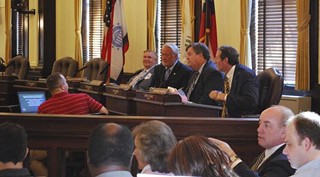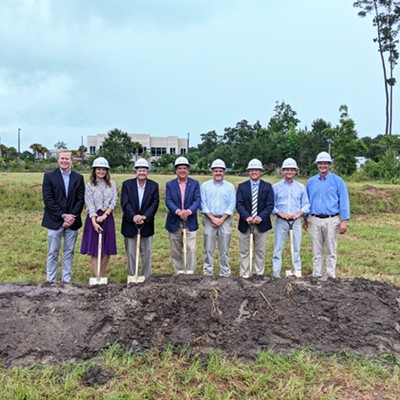The Public Service Commission (PSC), a panel of elected officials charged with regulating Georgia’s utility and telecommunications companies, paid a visit to Savannah last week for a public hearing on the $615 million rate increase requested by Georgia Power earlier this summer.
It was standing room only in the City Council chambers, where the hearing was held, and no one had shown up to support the idea of the area’s only electricity provider charging higher rates.
The 8.2 percent increase, if approved, will result in an additional cost of $10.88 per 1,000 kilowatt hours.
The meeting opened with ground rules being laid out, including a three minute time limit for each person wishing to comment, as well as a request not to ask the commission direct questions in the name of expediting what was anticipated to be a long hearing.
PSC Chairman Lauren “Bubba” McDonald then ran through a presentation outlining the commission’s duties, offering some background on the rate request process and a selective history of Georgia Power’s rates along with comparisons to other states.
The presentation seemed like a pitch to subdue the crowd’s ire, or least make the utility company seem more reasonable. McDonald pointed out that the cost of electricity had risen less than other consumer goods like gasoline or healthcare, and how residents of New York and New Jersey pay more for electricity than Georgians.
The comparison to utility rates in other states was addressed later in the hearing by one commenter who said that those numbers were meaningless because median income and cost of living differed so much between states.
While information from the PSC presentation mentioned the Georgia Power rate increases of 2004 ($194 million) and 2007 ($322 million), omitted from the presentation were more recent additions to monthly bills like fuel recovery cost increases, or the fees adopted by state legislators (2009’s Senate Bill 31) to fund construction of two new reactors at Plant Vogtle in Waynesboro.
Once the floor was opened to public input, so began the litany of concerns, frustration, disappointment and outrage.
Several citizens, many of whom came on behalf of neighborhoods or church groups, questioned the impact the hike would have on seniors living on fixed income. Others questioned whether the PSC was upholding their stated mission to protect consumers if they were passing a rate increase that would be used to bolster Georgia Power’s profit margin.
“They’re a monopoly,” said one commenter, citing “the privilege of guaranteed profits and no competition.”
“I wish I could buy my power from someone else,” said another gentleman.
Input from the public ranged from personal pleas to protect consumers who’ve fallen on hard times to well researched arguments about the nature of capital investments and management practices.
One of the most intriguing comments came from Ken Zapp, a Ph.D holding economist who moved to the area from Minnesota three weeks ago. He debunked the rationale that some of the rate increase would be needed for additional capital because interest rates were at historic lows and Georgia Power’s stock prices had been steadily climbing. He described the increase as “immoral and economically unnecessary.”
City Council member Tony Thomas made an appearance, standing on the other side of the podium from his usual place in council’s chambers. He cited the potential rate increase as a serious threat to economic recovery.
Part of Georgia Power’s rational for the rate increase, besides profit, is the costs it has incurred bringing out–dated coal burning plants into compliance with environmental regulations.
Thomas closed eloquently, stating, “the burden of modernization shouldn’t be on the shoulders of rate payers.”
Georgia Power will present its case to the Public Service Commission October 4–6, which will be followed by input from PSC staff at a hearing November 8–10, with a final decision being given on December 21.





























